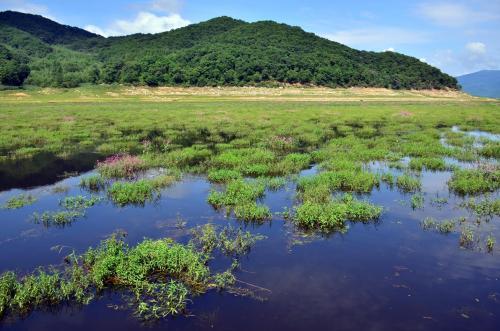HANGZHOU, Dec. 24 (Xinhua) -- Yang Qiang never regrets investing over 10 million yuan (about 1.53 million U.S. dollars) in building a rice-wine making plant in a mountain village in east China's Zhejiang Province last year since "the water there is valuable."
"Our high-quality products are made from the mountain spring water in Datian Village in the city of Lishui," said Yang, who had inspected several places before choosing the final investment destination as water quality is particularly important for his products.
A gross ecosystem product (GEP) evaluation report boosted his confidence to choose Datian Village. In 2018, the value of the "lucid waters and lush mountains" in the village was estimated to be 160 million yuan.
The GEP, created and advocated by the International Union for Conservation of Nature, is meant to be an accounting system that corresponds to gross domestic product (GDP) and measures the status of an ecosystem.
After the release of the report, entrepreneurs like Yang flocked to Datian Village, spawning 38 agritainment businesses. In 2019, the village's per capita disposable income jumped 10.3 percent year on year to 24,610 yuan.
Lishui has become the first pilot city in China to realize the value of ecological products and is making all-out efforts to turn the invaluable ecosystem assets into money while protecting the environment.
In May, the State Power Investment Corporation Limited reached a deal with Lishui's Dayang township for investing 170 million yuan in a photovoltaic power generation project while paying a local collectively-owned enterprise about 2.8 million yuan for local ecosystem products that favor power generation.
The excellent local ecological environment means greater profitability as the photovoltaic panels will have a longer service life in good air and solar radiation here is also stronger, said the company.
Lishui is not alone in exploring the use of ecosystem products to further promote green development.
In October, Zhejiang Province launched the country's first provincial-level GEP evaluation system in a bid to encourage local governments to attach more importance to protecting the environment and improving citizens' sense of happiness.
GEP evaluation can promote the development of industries covering ecotourism, homestays in rural areas and health rehabilitation and recreation in forests to gain economically from beautiful sights, said Xu Xing, an official with the Zhejiang Provincial Development and Reform Commission.
Chinese provinces including Jiangxi, Guizhou, Sichuan, Jilin, Guangdong and Yunnan all have GEP pilot projects, exploring the best practice to encourage the conservation of the ecological environment.
GEP evaluation can help China weigh the trade-offs while making important economic decisions and become a significant basis for government planning, said Zheng Hua, a researcher with the Chinese Academy of Sciences.
China will introduce a series of measures to facilitate the overall green transformation of economic and social development, according to the Communist Party of China Central Committee's proposals for formulating the 14th Five-Year Plan (2021-2025) for National Economic and Social Development and the Long-Range Objectives Through the Year 2035. Enditem




 A single purchase
A single purchase









